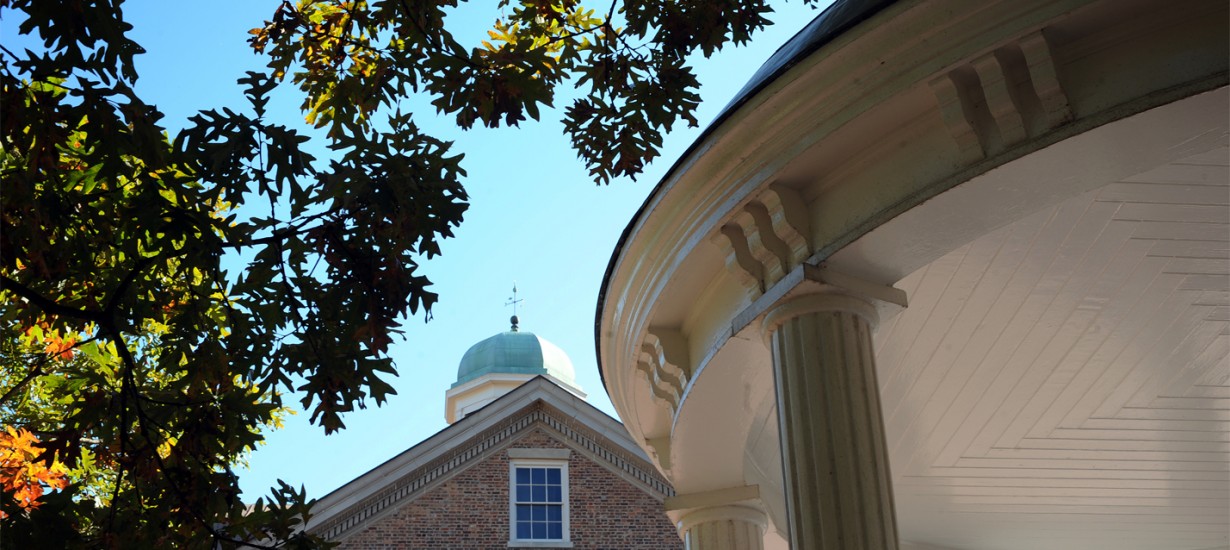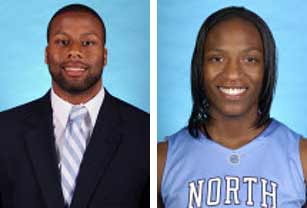UNC, NCAA Seek Dismissal of Athletes’ Class-Action Suit

The University and the NCAA have asked a federal court to dismiss a class-action lawsuit filed on behalf of two former Carolina athletes who claim that UNC did not deliver them the education it promised and who assert that the NCAA failed to uphold its stated mission of ensuring that athletes fully participate in and reap the benefits of the academic side of the understanding they have with the schools that recruit them.
The plaintiffs are Rashanda McCants ’09, who played basketball from 2005 to 2009, and Devon Ramsay ’12, who played football from 2007 to 2012. The suit, filed in January, draws on information about the paper classes scheme that existed at UNC for 18 years, ending in 2011, in the former department of African and Afro-American studies and from case examples of the NCAA’s interaction with schools across the country.
It seeks monetary damages along with “the formation of an independent commission to review, audit, assess, and report on academic integrity in NCAA-member athletic programs and certify member-school curricula as providing comparable educations and educational opportunities to athletes and non-athletes alike.”
 Devon Ramsay ’12 and Rashanda McCants ’09. |
The suit seeks monetary damages along with “the formation of an independent commission to review, audit, assess, and report on academic integrity in NCAA-member athletic programs and certify member-school curricula as providing comparable educations and educational opportunities to athletes and non-athletes alike.” The suit defines the class as everyone who attended UNC on athletic scholarships and enrolled in any of a long list of AFAM classes.
The University argued in documents filed Monday that the plaintiffs’ claims violated the 11th Amendment, which says that cases in which a state is sued by someone from another state or country cannot be heard by a federal court and that such claims’ three-year statute of limitations has expired.
The NCAA said that it does not have the responsibility to regulate and monitor the school and that the athletes have no standing to seek financial damages.
The suit was filed in Durham County Superior Court and, after the NCAA was included, was moved to the federal court for the Middle District of North Carolina.
McCants reached All-America status and played in the women’s professional league after graduating with a degree in communications studies. Ramsay, after playing football from 2007 to 2012, was dismissed from the team by the NCAA in the early months of UNC’s athletics-academics fraud case and later was reinstated after he was found innocent of any wrongdoing.
By seeking class status, the suit could have a broad impact, attracting more athletes from UNC and other schools who believe they were denied worthwhile educations.
One of the plaintiffs’ attorneys is Michael Hausfeld, who was the lead plaintiffs’ attorney in the recent challenge of former UCLA basketball player Ed O’Bannon against the NCAA over whether college athletes could be compensated for commercial uses of their names and likenesses. O’Bannon won, and the NCAA has appealed the decision. The McCants-Ramsay suit, which demands a jury trial, was filed by former N.C. Supreme Court Justice Robert Orr ’68 (’75 JD).
McCants is the sister of Rashad McCants, also a former star UNC basketball player, who has spoken out about not having gotten the education he expected at UNC. Rashad McCants, who took several of the fraudulent AFAM classes, left Carolina prior to his scheduled 2006 graduation to play professional ball. He is not listed as a plaintiff in the suit.
The suit says both plaintiffs were enrolled in “academically unsound classes that provided deficient educational instruction”; specific AFAM classes are listed for each.
The suit says that scholarship athletes “entered into valid implied contracts with UNC” when they signed on to participate in NCAA-sanctioned athletics programs. UNC agreed to provide them with, “among other things, a UNC education that included academically sound classes with legitimate educational instruction.”
UNC “breached the contract,” it said, by not delivering on that contract.
The suit says the NCAA “has made a firm promise and commitment to college athletes — that it will protect the education and educational opportunities of men and women participating in college athletics. Time and time again, the NCAA has held itself out as the principal guardian of college athletes’ academic welfare, reiterating its role as ensuring that college athletes are integrated into the student body and as ensuring that athletic participation does not compromise academic achievement.”
It also states: “UNC … complements the NCAA’s commitment through the school’s scholarship agreements with student-athletes, which promise academically sound instruction in exchange for enrolling at and playing college sports for UNC.
“The NCAA and UNC broke these promises and breached their duties to student-athletes in spectacular fashion.”
The suit details numerous cases at other universities in which incidents in athletics have come into conflict with the school’s academic values.
It takes issue with the notion that athletes who commit long hours to the pursuit of their sports have adequate time for academic requirements. It quotes NCAA President Mark Emmert as having told the Knight Commission on Intercollegiate Athletics in 2011: “The concern that we have is that we are bringing in young men and women who are not prepared for collegiate level education. And then we’re laying on top of them the 20, 30, 40 hours of work that’s required of a student to be a serious athlete, and their probability of success is … limited, to say the least.”
The suit quotes from the Knight Commission’s 2001 report, “A Call to Action: Reconnecting College Sports and Higher Education”: “Big-time athletics departments seem to operate with little interest in scholastic matters beyond the narrow issue of individual eligibility. They act as though the athletes’ academic performance is of little moment. The historic and vital link between playing field and classroom is all but severed in many institutions. …
“Athletes are often admitted to institutions where they do not have a reasonable chance to graduate. They are athlete-students, brought into the collegiate mix more as performers than aspiring undergraduates. Their ambiguous academic credentials lead to chronic classroom failures or chronic cover-ups of their academic deficiencies. As soon as they arrive on campus, they are immersed in the demands of their sports.”
It also cites the findings of an ad hoc committee formed at UNC in the late 1980s to examine the relationship between academics and athletics and its impact on athletes.
Known as the Betts Committee after its chair, the late English Professor Doris Betts ’54, most if not all of its recommendations were shelved. The suit quotes from its report that “all intercollegiate athletic programs of NCAA Division 1-A, including our own, are in varying degrees of conflict with the purposes and standards of universities, in general.”
It further quotes the report: “Intercollegiate sports programs are out of proportion to their functional place in the academic world, that some student-athletes are not students and do not genuinely represent the student bodies of which they are nominally members.”
UNC also is being sued on similar grounds by Michael McAdoo ’12, who was removed from the UNC football program in the early stages of the scandal. McAdoo, in a November 2014 filing, said Carolina did not provide him with the education it promised.
McAdoo’s complaint also is centered on the report of independent investigator Kenneth Wainstein, who in late October outlined the paper classes scheme in which athletes accounted for almost half of enrollments in the fake classes.
